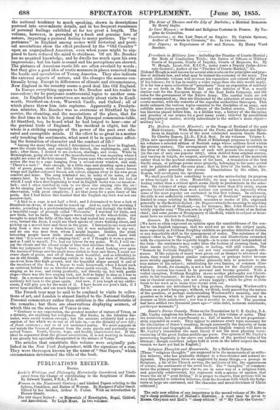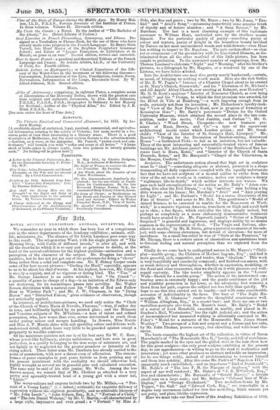PUBLICATIONS RECEIVED.
Boom.
Locke's Writings and Philosophy Historically Considered, and Vindi- cated from the Charge of contributing to the Scepticism of Hume. By Edward Tagart, F.S.A., F.L.S.
Woman in the Nineteenth Century ; and kindred Papers relating to the Sphere, Condition, and Duties of Woman. By Margaret Fuller Ossoli. Edited by her brother, Arthur B. Fuller. With an introduction by Horace Greely. rise Old Court Suburb: or Memorials of Keasington, Segal, Critical, and etnectlotical. By Leigh Hunt. In two volutes. The Briar of 2'hreave and the Lily of Barhohn ; a Metrical Romance, By Henry Inglis.
Le Curd Manqué; or Social and Religious Customs in France. By Eu- gene de Courcillon.
Constantine ; or the Last Days of an Empire. By Captain Spencer, Author of "Travels in Circasaia," &c. In two volumes.
Star Papers; or Experiences of Art and Nature. By Henry Ward Beecher.
Precedents in Military law : including the Practice of Courts-Martial ; the Mode of Conducting Trials; the Duties of Officers at Military Courts of Inquests, Courts of Inquiry, Courts of Requests, &c. By W. Hough, Lieut.-Col. E.I.C.S., many years a Deputy Judge-Advo- cate-General ; Author of the "Practice of Courts-Martial," /to.
[.Colonel Hough is well known for several able works on the principles and prac- tice of military law, and what may be termed the economy of the army. The present elaborate volume will increase his reputation and extend the utility of his labours; for it has in reality a wider range than the title would imply. It is far less a mere collection of "precedents " than an exposition of military law as set forth in the Mutiny Bill and the Articles of War, a nearly similar code for the European troops of the East India Company, and the rules for the government of the Native Army. The martial texts are not merely commented on ; they are illustrated by the adduction of cases tried by courts-martial, with the remarks of the superior authorities thereupon. This mode exhausts the various topics essential to the discipline of an army, and exhibits some duties peculiar to officers of the Indian armies. The reader has likewise placed before him, in a lifelike way, a history of the discipline and practice of our armies for a good many years ; relieved by anecdotical and biographical matter, strictly subordinate to the author's main object— military law.]
The Modern Scottish Minstrel; or the Songs of Scotland of the past Half-Century. With Memoirs of the Poets, and Sketches and Speci- mens in English verse of the most celebrated modern Gaelic Bards. By Charles Rogers, LL.D., F.S.A. Scot. In six volumes. Volume I. [This new speculation of Messrs. Black of Edinburgh proposes to include in six volumes a selected edition of Scottish songs whose authors lived within the present century. The arrangement will be chronological according to the lives of the authors ; a memoir of each will precede the songs or song (in the case of only one popular ditty), often derived from original sources, and varying in length, we suspect, according to the nature of the materials rather than to the poetical eminence of the bard. A translation of the best Gaelic songs, or perhaps poems more properly, belonging to the same period will be published after the same plan ; that is, lives of the bards, in chro- nological order preceding the poems. Dissertations by the editor, Dr. Rogers, will accompany the specimens. We shall possibly have something to say on the series during its progress or when brought to a close. Meanwhile, we may remark that a national feeling rather than a critical spirit seems likely to predominate in the selec- tion. Six volumes of songs comprising little more than fitty years, argues greater lyrical richness than most nations can pretend to, especially when some of the most popular are contained in this first volume. In strictness, the title is not sufficiently extensive. "Songs of Scotland' seems properly limited to songs relating to Scottish manners or modes of life, expressed generally in the Scottish dialect Dr. Rogers extends the meaning to anything written by natives of Scotland,—as, for instance, Mrs. John Hunter's once widely popular song "The sun seta in night "—the death-chant of an Indian chief; and some poems of Montgomery of Sheffield, which in subject or treat- ment have no relation to Scotland.] Sonnets. By Feltham Burghley. [We have so often expressed an opinion upon the unsuitableness of the son- net to the English language, that we need not go into the subject again, more especially as Feltham Burghley exhibits no peculiar felicities of diction or any remarkable skill in the management of metre. The substance of the sonnet—that is, the "thought," and the ideas and illustrations connected with its expansion to the requisite length—is to some extent independent of the form : the sentiments may suffer from the fashion of dressing them, but their innate novelty, truth, weight, or feeling, will still rupiah'. The "Sonnets by Feltham Burghley" are not very successful as regards sub- stance. If the subjects of many were given out as themes to advanced stu- dents, they would produce similar conceptions, or perhaps better because more strictly appropriate. The author generally fails to penetrate to the true nature of his subject; substituting his own fancies, or common illus- trations. Death, for example, is not a bad theme for the English sonnet,
which by custom has ceased to be personal and become general. With a verbal exception, Feltham Burghley shows neither philosophy nor Christi- anity in his treatment; he draws his images and illustrations from Pagan- ism or classical antiquity, and not always happily ; while he gives so little finish to his work as to make trim rhyme with sin. The' sonnets are introduced by a long preface, discussin; Wordsworth's dictum on a poet's language ; without, we think, truly perceiving the nature
of the question, or perhaps understanding Wordsworth's meaning, and the question as to what is the poet's primary business, which is treated in a manner as little satisfactory ; nor was it needful to raise it. The question had been settled two thousand years ago—" utile dulci, lectorem deleetando, pariterque monendo."]
Dante's Ilitrine Comedy. Notes on the Translation by C. B. Cayley, B.A. [Mr. Cayley completes his labours on Dante by this volume of notes. They are numerous, but not superfluously so ; full of matter, but not proportion- ately expanded in words. They appear to embrace every topic necessary for the elucidation of Dante's meaning, though necessarily the majority of them are historical and biographical. Henceforward English readers will have in Mr. Cayley's translation the most literal if not the most pleasing verse. rendering of the great Italian middle-age poem. Our opinion of Mr. Cayley's persevering ingenuity is far above our estimate of the poetical value of his attempt; though excellent judges hold it even in the latter respect the best version we have yet had in English.]
Religious Thoughts and Memoranda. By a Believer in Nature.
[These "religions thoughts" are supposed to be the memoranda of an ortho- dox believer, who has gradually changed to a free-thinker and natural re- ligionist. l'he primary ideas are suggested by many things,—a passage in Scripture, a bit of the Church service, the incidents of life, the appearances of nature, the sentiments of the mind itself. The " thoughts," or commen- taries the primary topics give rise to, are in some way a a religious kind, and generally controversial, but expressed with a species of unction that wears the air of "good feeling." It is proper to observe, that portions will be very distasteful to orthodox believers, from the freedom with which the Scrip- tures at large are canvassed, and the character and moral doctrines of Christ criticized.] The only new edition of any importance is the second volume of Mr. Mur- ray's cheap publication of Hallam's Histories. . A word may be given to Keens. Chapman and Ilall'e "cheap edition" of "My Uncle the Curate."
View of the State of Europe during the Middle Ages. By Henry Hal- lam, LL.D., F.R.A.S., Foreign Associate of the Institute of France. In three volumes. Volume IL Eleventh edition.
My Uncle the Curate : a Novel. By the Author of "The Bachelor of the Albany," &c. (Select Library of Fiction.)
Oral Exercises in French Phraseology, Synonymy, and Idioms. De- signed as a Vocabulary or Phrase-Book, for the use of those who have already made some progress in the French Language. By Henry Stein Turret), late Head Master of the Brighton Proprietary Grammar School ; and Editor of "Lecons Francaises, de Litterature et de Morale, en prose et en vers." Second edition, revised and corrected. How to Speak French : a practical and theoretical Tableau of the French Language and France. By Achille Albites, LLB., of the University of Paris, &c. Fourth edition.
Bedside Letters on Hydropathy ; or Clinical Experience of the Effi- cacy of the Water-Cure in the treatment of the following diseases— Consumption, Inflammation of the Eyes, Constipation, Gastric Fever, Nervousness, Inflammation of the Lungs, Rheumatic Gout. By W. Alfred Johnson, M.D. Second edition.
MAPS.
Atlas of Astronomy; comprising, in eighteen Plates, a complete series of Illustrations of the Heavenly Bodies, drawn with the greatest care from original and authentic documents, by Alex. Keith Johnston, F.R.S.E., F.A.G.S., F.G.S., Geographer in Ordinary to her Majesty for Scotland; Author of the "Physical Atlas," &c. Edited by J. R. Hind, F.R.A.S., &c. [See note under the head of Fine Arts.]
ALMANACS.
The Victoria Nautical and Commercial Almanack, for 1855. By An- drew Murray.
[A creditable digest of statistical, legal, nautical, commercial, and agricultu- ral information relating to the colony of Victoria ; but more useful in a bu- siness point of view than interesting in a literary sense. There is a good description of Melbourne, but the most curious feature is the advertisements —London, as it were, at the Antipodes. Mr. Pursell, "pastry-cook and con- fectioner," will furnish you with "coffee and soups at all hours." "A large stock of bride-cakes is always ready, from two guineas to twenty guineas each." No falling-off in prices here!]
PAMPHLETS.
A Letter to the Viscount Palmerston, &e. in May 1855, by Charles Dodgson M.A., Archdeacon of Richmond.
The Bight of Women to exercise the Elec- tive Franchise. By Justitia.
A few Words about the Inmates of our Union Workhouses.
The Ten Commandments familiarly Ex- plained; for the use chiefly of Candi- dates for Confirmation. By the late Reverend Thomas Mums, ALA., In- cumbent of Holy Trinity Church, Leeds.
The Cross of Christ ; or Meditations on the Death and Passion of Our Blessed Lord and Saviour. Edited by Walter Farquhar Rook, D.D., Vicar of Leeds.
The Apostles' Creed; Devotionally and Practically Considered. By the Honourable Grantley F. Berke- ley. M.P.
War Notes; being Fragments and Rough Thoughts on the War and the present Crisis. By a Civil Commentator.
Prophecy for 1855. Selected from Car- l) le's " La t ter-Day Pamphlets," 1b5J. By Thomas Ballantyne.
Mow shall the Strong Man one his Strength or the Right and Duty of War, with Application to the present Crisis. By Vernon Lushing,ton.
A Charge delivered to the Clergy and Churenwardens of the Archdeaconry of Richmond, at his Primary Visitation,



































 Previous page
Previous page